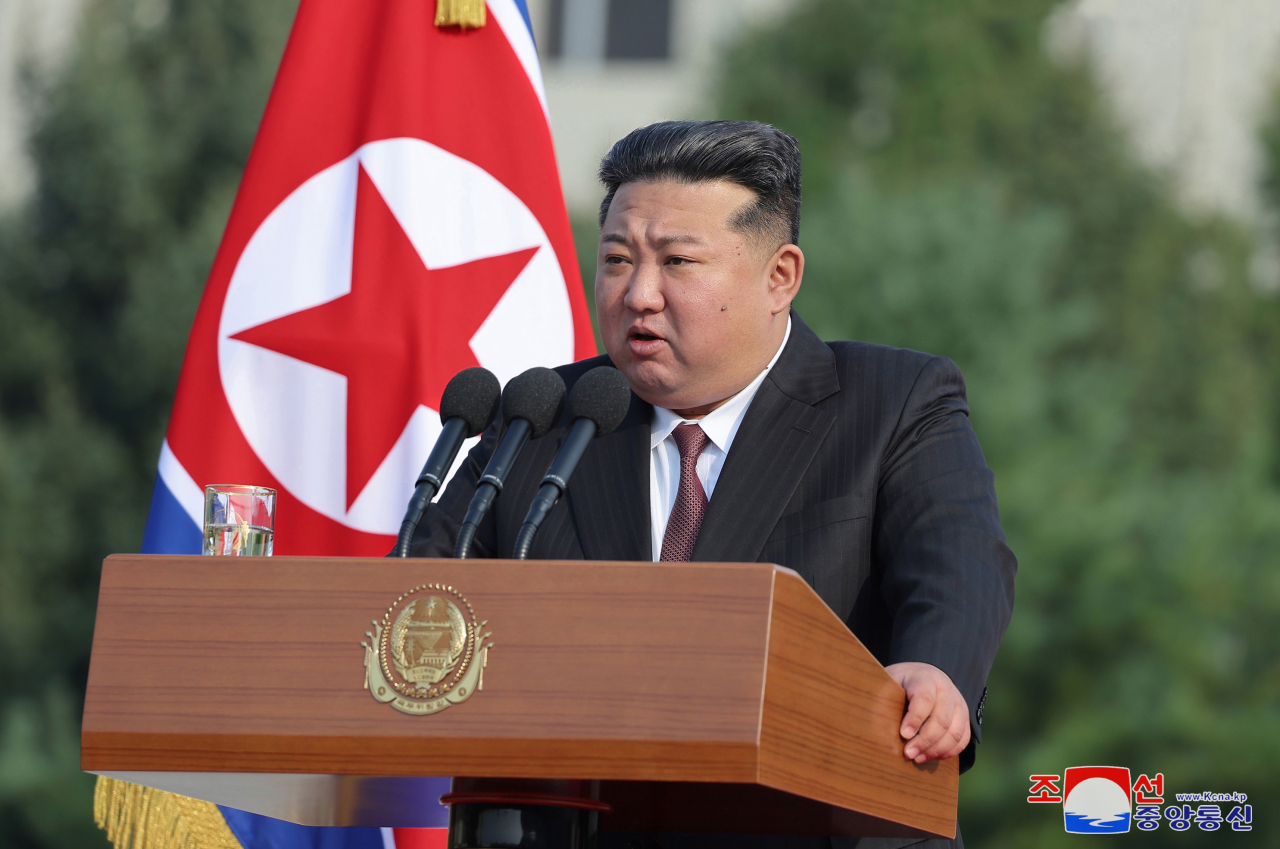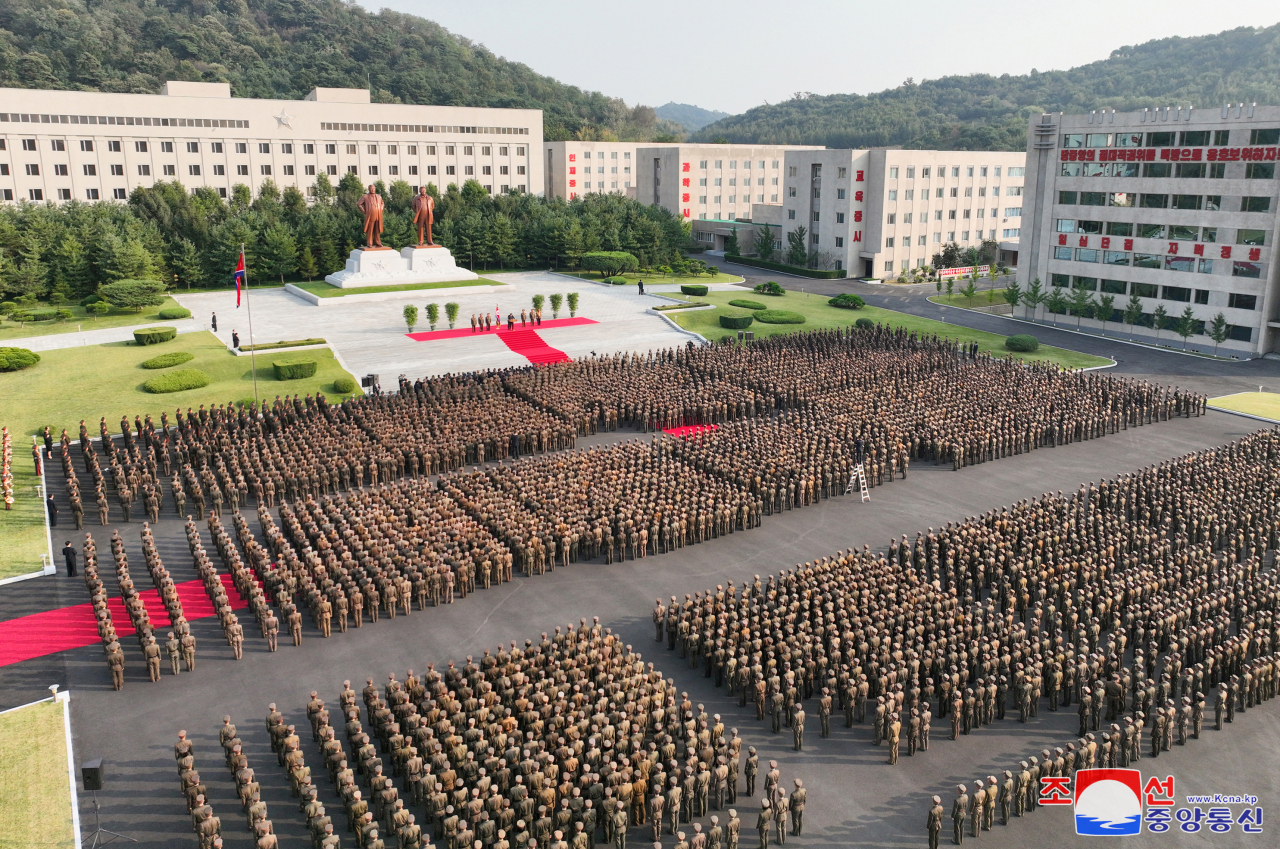 |
North Korean leader Kim Jong-un delivers a speech during a visit to Kim Jong-un University of National Defense in Pyongyang on Monday, marking the school's 60th anniversary, in this photo provided by North Korea's state-run Korean Central News Agency the following day. (Yonhap) |
North Korean leader Kim Jong-un warned Monday that Pyongyang would "not tolerate" any disruption to the Korean Peninsula's balance of power, which he claimed is upheld by North Korea's nuclear arsenal and threatened by the growing "nuclear alliance" between South Korea and the United States.
However, Kim simultaneously asserted that North Korea had no intention of attacking the South, North Korea's state media reported Tuesday. The remarks came during his 60th-anniversary commemoration speech at the Kim Jong-un University of National Defense, which was renamed in his honor.
Kim again condemned President Yoon Suk Yeol's Oct. 1 Armed Forces Day speech, the military parade featuring the Hyunmoo-5 missile, a US B-1B bomber flyover, as well as the launch of South Korea's Strategic Command, which is designed to integrate the country's advanced conventional forces with the US' extended deterrence capabilities.
In his speech, Kim asserted that Yoon's address is "ultimately a foolish attempt to somehow maintain a balance of power by relying on the 'Korea-US alliance,' which has mutated into a nuclear-based military bloc."
"The more the enemies desperately struggle to achieve superiority in power and overturn the strategic situation by using the 'nuclear alliance' as a weapon, the more we must continue to achieve leaps in defense science and industry, and infinitely strengthen our self-defensive war deterrence," North Korean state media reported Kim as saying in Korean.
Kim warned, "The destruction of the strategic balance of power on the Korean Peninsula means war."
"If the enemies attempt to use military force against our country, the armed forces of our Republic will employ all offensive capabilities without hesitation. This does not exclude the use of nuclear weapons," Kim said.
Meanwhile, Kim stated the way for South Korea to live safely is simple: "All they need to do is stop provoking us needlessly and refrain from engaging in 'shows of strength' at our expense."
"Frankly, we have no intention of attacking the Republic of Korea at all. Even the thought of it gives us chills, and we have no desire to face those people," Kim said, referring to South Korea by its official name.
 |
North Korean leader Kim Jong-un (center on the podium) delivers a speech during a visit to Kim Jong-un University of National Defense in Pyongyang on Monday, marking the school's 60th anniversary, in this photo provided by the North's official Korean Central News Agency the following day. |
Show of Kim's frustration
Lim Eul-chul, a professor of North Korean studies at Kyungnam University's Seoul campus, observed, "The message to the Yoon Suk Yeol government -- urging it to stop needlessly provoking North Korea and to focus on managing the situation to prevent military conflict -- reflects an extreme sense of encirclement as well as concerns about a regime crisis that could arise from an unintentional nuclear war."
"There is also a sense of frustration that their possession of nuclear weapons has not effectively served as a deterrent to war and has, rather, led to the strengthening of (South) Korea-US extended deterrence and the deployment of US strategic assets on a permanent basis," Lim said.
Lim explained that the essence of Kim's recent messages to the US and South Korea revolves around a consistent stance on military force: any attempt to use force against North Korea will result in an immediate full-scale response, including nuclear weapons.
Kim conveyed a similar warning during his inspection of a special operations training base on Oct. 2, as reported by state media later on Friday.
"This paradoxically shows that North Korea is highly sensitive to the dynamics of the Korea-US nuclear-based alliance and intends to escalate its nuclear response posture, using this alliance as justification," Lim said.
Kim views that the destruction of the strategic balance of power as a trigger for war justifies North Korea's nuclear ambitions and exposes the regime's underlying anxieties, according to Lim.
Hong Min, a senior research fellow at the government-funded Korea Institute for National Unification, noted that Kim's speech, "ultimately underscores the need to manage the situation rather than create tensions through reckless provocations, while highlighting asymmetry between a nuclear-armed state and a non-nuclear state and discrepancies between nuclear and conventional forces."
"In the broader context, North Korea aims to either gain recognition as a nuclear weapons state or secure the desired nuclear negotiations with the US. If those efforts fail, it intends to leverage the new Cold War environment to seek support for its status as a nuclear weapons state within its bloc, including Russia and China," Hong said.
"North Korea therefore considers conflict or localized tensions with South Korea to be of no benefit, and appears to adopt either a strategy of ignoring South Korea or responding proportionally," Hong added.
Kim's speech symbolically coincided with the pre-announced opening day of the Supreme People's Assembly session, during which the Unification Ministry in Seoul has largely expected to enshrine the concept of the two Koreas as separate states in a belligerent, hostile state within its socialist constitution.





![[Herald Interview] How Gopizza got big in India](http://res.heraldm.com/phpwas/restmb_idxmake.php?idx=644&simg=/content/image/2024/11/20/20241120050057_0.jpg)

